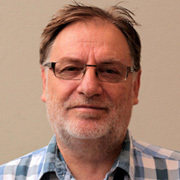
Ivars Berzins
Ivars Berzins, who co-runs Wellington company Pacific Screen with Amanda Evans, fell in love with photography at the age of eight — the age he first got his hands on a Kodak instamatic camera.
Ivars' parents arrived in New Zealand from their native Latvia, having fled the Soviet takeover of the country that began near the end of World War ll. Ivars suspects his long interest in putting people's stories on film was influenced by their belief in the importance of free speech. "Part of me believes that a big section of our society is under-represented," he says. "They need a voice."
Fresh from time in the school dark room, Berzins got a camera assistant job with the government’s National Film Unit at the beginning of 1977. It was during this period that he worked on his only feature film to date — as clapper loader on NFU co-production The Scarecrow.
In 1982 Berzins joined TVNZ as a film cameraman. Aside from a couple of years away from the industry in the mid 80s, he stayed with the state broadcaster through until 1996. By the end of his time there he was chief cameraman at Wellington News and Current Affairs bureau, having shot a wide range of news and current affairs assignments, including stories for Close Up, Assignment, 60 Minutes, and Holmes. The job took him around New Zealand, and from beaches in East Timor to the UN building in New York.
In 1996 Berzins set up Pacific Crews, intending it as a one-stop shop for local and visiting filmmakers. Known these days as Pacific Screen and run by Berzins and his wife, producer Amanda Evans, the company concentrates on filming for the small screen in all its permutations.
Berzins has shot many items for Tagata Pasifika and Asia Down Under. He is also very proud of his work on the acclaimed Lost in Libya — "an extremely challenging assignment" in the 40 degree heat of the Sahara Desert, in search of the last remaining traces of the Long Range Desert Group.
His contributions to missing persons show The Missing won praise from The Dominion Post as being “beautifully and imaginatively filmed, but without gimmickry”.
In 2007 Pacific Screen began venturing into productions and co-productions, starting with half-hour interview show My God. Long interested in "real people, and real stories", Berzins himself had began adding official director credits to his resume around 2004, when he helmed documentary Till the Cows Come Home, about how people in the Manawatu town of Scotts Ferry were affected by the February 2004 floods.
Since then he has directed episodes of the long-running My God and on wideranging series New Zealand Stories, including episodes on the fight to save Christchurch’s ‘Basilica’ post quake, and a medical mission to the Philippines.
Long intrigued by the Gloriavale Christian Community on the West Coast, Berzins and Amanda Evans began work on Gloriavale - A World Apart, the first of three documentaries in which Berzins' camera was allowed into the community. The trio of docos all rated well, and provoked keen discussion on social media. In 2016 the first two films scored awards in the Community Portrait section of the New York Festival.
In 2022 Berzins was proud to be shooting for two of the highest rating shows on competing television networks: the long-running Country Calendar, and David Lomas Investigates.
Profile updated on 18 August 2022
Sources include
Ivars Berzins
Paulette Crowley, 'The man behind the award-winning Gloriavale documentary' (Interview) Stuff website. Loaded 23 April 2016. Accessed 4 May 2016
Review of The Missing - The Dominion Post, 8 July 2009